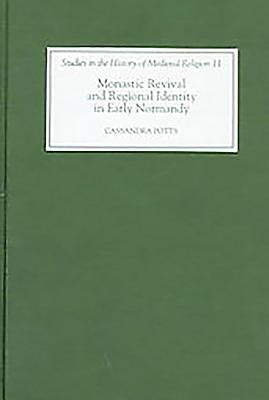
- We will send in 10–14 business days.
- Author: Cassandra Potts
- Publisher: Boydell Press
- ISBN-10: 0851157025
- ISBN-13: 9780851157023
- Format: 16.1 x 23.9 x 2.1 cm, kieti viršeliai
- Language: English
- SAVE -10% with code: EXTRA
Monastic Revival and Regional Identity in Early Normandy (e-book) (used book) | bookbook.eu
Reviews
Description
Normandy transformed from military power base of pagan Norse invaders to Christian political entity.
The rulers of Normany performed a complex juggling act: starting from a pagan Norse military power base round Rouen, they built an accepted political entity within the boundaries of the Christian state their ancestors had invaded.Successfully reconciling Viking, Frankish and Breton elements within their realm, the Norman rulers created "one people out of the various races", in the words of one eleventh-century writer. As part of that effort, they revivedand reformed the monasteries in the region, enlisting the aid of prestigious abbots from reform centres beyond Normandy. By the early eleventh century, there was a consciousness within the region that a new people as well as a newprincipality had taken shape over the course of the past century. In this process of state-building and ethnogenesis, the revival and reform of monasticism played a crucial role. This book evaluates the relationship between Norman lords and monastic communities and demonstrates how that relationship contributed to the political and social evolution of the duchy. Through this regional focus, Monastic Revival and Regional Identity in Early Normandy adds to an understanding of the role monasticism played in tenth and eleventh-century European society, and, more broadly, in the formation of political and cultural entities in medieval Europe. The conclusions presented in this study are based on an analysis of published sources as well as over two hundred unpublished monastic charters located in Norman archives and libraries. Dr CASSANDRA POTTS teaches at Middlebury College.EXTRA 10 % discount with code: EXTRA
The promotion ends in 22d.06:42:57
The discount code is valid when purchasing from 10 €. Discounts do not stack.
- Author: Cassandra Potts
- Publisher: Boydell Press
- ISBN-10: 0851157025
- ISBN-13: 9780851157023
- Format: 16.1 x 23.9 x 2.1 cm, kieti viršeliai
- Language: English English
Normandy transformed from military power base of pagan Norse invaders to Christian political entity.
The rulers of Normany performed a complex juggling act: starting from a pagan Norse military power base round Rouen, they built an accepted political entity within the boundaries of the Christian state their ancestors had invaded.Successfully reconciling Viking, Frankish and Breton elements within their realm, the Norman rulers created "one people out of the various races", in the words of one eleventh-century writer. As part of that effort, they revivedand reformed the monasteries in the region, enlisting the aid of prestigious abbots from reform centres beyond Normandy. By the early eleventh century, there was a consciousness within the region that a new people as well as a newprincipality had taken shape over the course of the past century. In this process of state-building and ethnogenesis, the revival and reform of monasticism played a crucial role. This book evaluates the relationship between Norman lords and monastic communities and demonstrates how that relationship contributed to the political and social evolution of the duchy. Through this regional focus, Monastic Revival and Regional Identity in Early Normandy adds to an understanding of the role monasticism played in tenth and eleventh-century European society, and, more broadly, in the formation of political and cultural entities in medieval Europe. The conclusions presented in this study are based on an analysis of published sources as well as over two hundred unpublished monastic charters located in Norman archives and libraries. Dr CASSANDRA POTTS teaches at Middlebury College.

Reviews